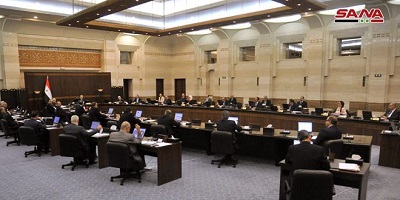The Cabinet takes new measures in the sectors of agriculture, industry and foreign trade to support economic development and establish self-reliance
The Cabinet has approved new measures in the sectors of agriculture, industry, foreign trade and at the social level with the aim of continuing to support economic development, boost self-reliance and stimulate the import of basic materials not produced locally.
The Cabinet’s measures come in light of economic and social changes locally and internationally as a result of addressing the Corona epidemic and within the state’s plan to overcome the impact of the economic unilateral measures imposed by Western countries on Syria.
In its weekly session on May 17, headed by Prime Minister Eng. Imad Khamis, the Cabinet allowed the private sector to import fertilizers and allowed the General Feed Orgaization to import feed and distribute it to poultry, and to study a draft law to reduce customs duties on Soybeans and yellow corn by 50 percent and exempt them from other fees and other taxes and raise a plan to import agricultural tractors from one thousand to five thousand and sell them to farmers with subsidized interest.
The Cabinet allocated 1.5 billion pounds to continue the programs to support rural women, encourage family crops projects , and the credits required for the production of potato seeds during the period from 2020 to 2023.
In the industrial sector, the Cabinet decided to take immediate emergency steps to market public sector products with 15 percent less than the market price. The Cabinet asked Chambers of Industry and Craftsmen to establish ‘popular markets’ for the purpose of delivering goods from the producers to the consumer directly.
The Cabinet tasked the Ministry of Industry to increase the production of companies and factories in cities and industrial areas.
The Cabinet approved the Ministry of Social Affairs project to grant loans to the demobilized from the science service through banks and “microfinance institutions” with the guarantee of the National Aid Fund and the Loan Risk Guarantee Corporation, where the aid fund shoulder the payment of interest from those who finished their military service to enhance their opportunity to enter the labor market.
The Cabinet mandated the Ministry of Economy and Foreign Trade to provide facilities to secure the basic materials without any interruptions and expedite the granting of import licenses for these materials in addition to the requirements of agricultural and industrial production.
The Cabinet approved a list of 67 items to be produced locally and offer them for investment.
The Cabinet affirmed ensuring the supplying of the electric power for industrial and crafts establishments and agricultural projects and approving the installation of electronic meters and a remote automatic reading system.
The Cabinet stressed that all public bodies control public correspondences and activate the use of electronic correspondence instead of paper and tighten control over procurement committees and maintenance contracts.
The Council approved the Ministry of Oil’s plan to secure the quantities of fuel needed for the agricultural and industrial sectors.
In a statement to reporters, the Minister of Agriculture and Agrarian Reform Eng. Ahmed Al-Qadri pointed out the importance of modern irrigation in rationalizing and raising the efficiency of water use and the need to continue securing cows at subsidized prices for breeders.
The Minister of Industry, Eng. Muhammad Maan Zain Al-Abideen Jaddaba confirmed that the ministry managed to operate 42 production lines and introduce 32 new production classes to the public sector.
He indicated that the central halls of the ministry in the governorates and the promotion of popular markets contribute to the delivery of products and materials manufactured from the producers to the consumer directly.
For his part, the Minister of Economy and Foreign Trade, Dr. Muhammad Samer Al-Khalil announced that the Ministry was able, in cooperation with the public authorities, to complete all the files related to the substitution program for import substitutes. This promising program enables those wishing to invest in business sectors to be acknowledge about investment opportunities in it.
O. al-Mohammad

